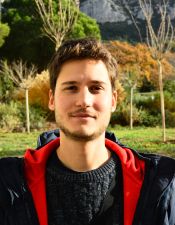
Thesis Project Description:
The adaptive immune system, characterized by the specificity of its response and the creation of immune memory, relies on the activation of rare and unique T and B lymphocytes specific against the infecting pathogen. The efficacy of the response is achieved by selecting the relevant cells among a large population of different reactivity. For T lymphocytes, this selection is mediated by dendritic cells that arrive in secondary lymphoid organs loaded with the antigen and need to screen, in a reasonable time frame, the full repertoire of T cells until finding the reactive ones. As the frequencies of both cell types are low early in an infection, one hypothesis is that an active mechanism may guide the naive and memory T cells towards the activated dendritic cells. This process may be mediated by small soluble compounds called chemokines, which have proven to affect the migrational behavior of immune cells. Chemokines can induce chemokinesis (enhanced but random migration), chemotaxis (directed migration along a soluble gradient) or haptotaxis (directed migration along an adsorbed gradient). In this project we propose to identify the chemokines used by activated dendritic cells to attract lymphocytes through soluble (chemotaxis) or adsorbed (haptotaxis) gradients. Our strategy consists in designing innovative in vitro assays based on microfluidics and advanced optical protein micropatterning techniques to quantitatively decipher the intercellular guidance mechanisms.
Thesis Supervisors:
Interdisciplinary Research Axis:
Imaging
Academic Background:
University degree (5 years) in Biotechnology, Universidad Nacional de San Martin, Argentina
